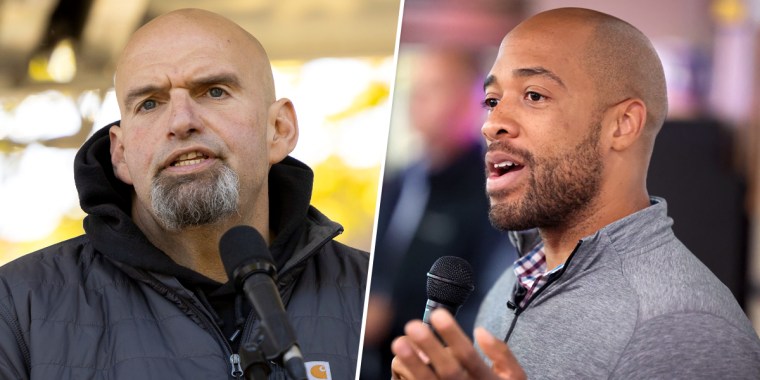WASHINGTON — At stake in this year’s key Senate races is not just the balance of power between the parties, but within them. For the left-flank of the Democratic Party, that means proving it can win when it matters most.
The liberal and moderate wings of the party have been engaged in a yearslong debate over whether candidates should embrace progressive policies and postures to fire up the base, or tack to the middle to appeal to swing voters. The moderates have long held the upper hand and seen their theory of politics adopted more often than not.
With progressive candidates Mandela Barnes in Wisconsin and John Fetterman in Pennsylvania carrying the Democratic Party’s banner, liberals are excited about the possibility of proving the doubters in their own party wrong — and already dreading about what they might say if their candidates lose.
“Progressives do need to demonstrate that we can win [battleground] statewide elections and that our candidates can represent the party effectively,” said Max Berger, a progressive strategist and former aide to Sen. Elizabeth Warren’s 2020 presidential campaign. “Until we’ve shown that we can do it, there will always be the question.”
Control of the Senate could very possibly come down to Wisconsin and Pennsylvania, and liberals see both opportunity and risk.
“Those are two big races for us, and we’ve got to do everything we can to win,” said Rep. Ro Khanna, D-Calif., a co-chair of Sen. Bernie Sanders’ 2020 presidential campaign.
And they can already anticipate, with eye-rolling resignation, the friendly fire they expect to face if their candidates don’t succeed.
“Anytime a progressive loses it’s always used a sledgehammer against all of us,” said Randy Bryce, a Wisconsin union organizer and former congressional candidate.
Some progressive House candidates recently lost high-profile races — a sign, according to moderates, that they can't win swing districts. And Republicans successfully used “defund the police,” a position adopted by only a handful of candidates on the left, to drag down Democrats’ entire congressional slate in 2020.
Now this year's Senate races represent one of the toughest electoral challenges yet for the modern progressive movement.
While left-wing insurgent groups like Justice Democrats often take on the “Democratic establishment” in House and other down-ballot primaries, they have yet to pick a fight and win in a top-tier Senate race, which operate on dizzying scales of money and scrutiny compared to even a high-profile House race.
These groups will back progressives in open Senate races, but have yet to recruit someone to run against an incumbent Democrat.
“Part of what you’re seeing is, it’s harder to go from A or AA straight to the majors, and we’re still building up the farm team," Berger said. "Justice Dems, who are best-in-class, have not run a Senate candidate because they’re strategically conservative and, I assume, don’t think they can win.”
In 2016, Fetterman challenged Katie McGinty, the Democratic Senatorial Campaign Committee’s favored candidate in the Pennsylvania Democratic Senate primary. When McGinty went on to lose the general election to Republican Sen. Pat Toomey, many on the left grumbled that Fetterman would have won if only given a chance. Now he has that chance. (Toomey is not running for re-election.)
Barnes, too, first made waves by taking on a moderate Democratic incumbent in the Wisconsin state Senate in 2016 and losing in the primary.
But both Fetterman and Barnes then went on to be elected lieutenant governor, statewide victories that helped them convince party insiders they could win U.S. Senate races.
Both faced serious competition from more moderate candidates in their primaries, but Barnes ended up clearing the entire field before a single vote had been cast, while Fetterman won his May primary over Rep. Conor Lamb in a landslide.
Both, though, have learned the benefits of repositioning in the general election to make moderate Democrats, independents and even some disaffected Republicans feel comfortable voting for them, with Fetterman talking up his law-and-order credentials and Barnes campaigning with moderates like Sen. Amy Klobuchar, D-Minn.

“His whole campaign is, he’s not running as progressive as he was in the past. But he’s definitely one of us,” Bryce said of Barnes.
Nayyera Haq, a Sirius XM Progressive channel host and former Obama White House official, said Barnes and Fetterman are uniquely strong candidates because they come across as authentic and nonthreatening to those voters who may not hold the most progressive views on race and gender.
“They don’t fit the profile of progressive boogeyman — the female, women of color from The Squad — so in many ways swing voters are able to focus on the policies the candidates are advocating,” she said. “Marijuana legalization is hugely popular. So is gun control. So is a public health insurance option. What the majority of Americans support is somehow labeled progressive, which is part of the problem of basing political messaging out of Washington.”
Wisconsin Democratic Party Chair Ben Wikler said the lesson from past elections is that voters ultimately will choose a candidate who will stay true to their Wisconsin roots, regardless of ideology.
“In states like Wisconsin, it’s often less a left versus right spectrum and more a question of who people feel is on their side. That’s how you get a state that elected Tammy Baldwin and Ron Johnson,” Wikler said. “The common thread is folks who connect at the level of ‘This person gets me and is gonna fight for me.’ That’s really where Mandela’s strengths shine through.”
Irene Lin, who headed communications for Democratic Senate primary candidate Tom Nelson, who dropped out to endorse Barnes, said that to win in swing states, progressives need to highlight their pro-labor, pro-worker and populist bonafides — and avoid being pigeonholed as a what she called a “pronoun progressive," who are perceived as being more concerned with waging the culture war than raising wages.
“I think when they don’t win is if they get caught on the wrong end of culture wars,” Lin said. “Don’t be a pronoun progressive."
Many on the left feel their side is held to a standard that does not apply to moderates, where the rejection of a single liberal candidate is viewed as a rejection of all progressive candidates.
If Mandela and Barnes lose, they argue, it will be because the political headwinds Democrats face this year are too strong and the Republican super PACs too well funded, not because of their ideology — and that lots of moderate Democrats will likely go down with them.

“They are experiencing what Democrats in competitive races are experiencing from every part of the coalition. There is nothing unique or exceptional about this. All of these races are going to be close,” said Maurice Mitchell, the national director of the progressive Working Families Party. “It’s the water that we’re all swimming in.”
Still, Republicans have found more ammunition than they might have against another Democrat when making predictable accusations of radicalism against Fetterman and especially Barnes.
Barnes’ opponent, Republican Sen. Ron Johnson, recently seized on the revelation that Barnes had appeared on Russian-funded TV in 2015 and 2016, where he was critical of American police, to push the message that Barnes is extreme.
And Fetterman’s outspoken advocacy for criminal justice reform, and especially his work on the state parole board, has been prominently featured in attack ads by his Republican opponent, the celebrity TV doctor Mehmet Oz, and his allies.
“On one level, Republicans are running the same play in every race: trying to label Dems as far-left socialist extremists. This is preposterous, but it can be potent,” said Matt Bennett, the executive vice president of the centrist Democratic think tank Third Way, which has often sparred with the left in House primaries. "Democrats must convince voters they represent the real mainstream in their communities and that Republicans are the ones who are extreme.”



